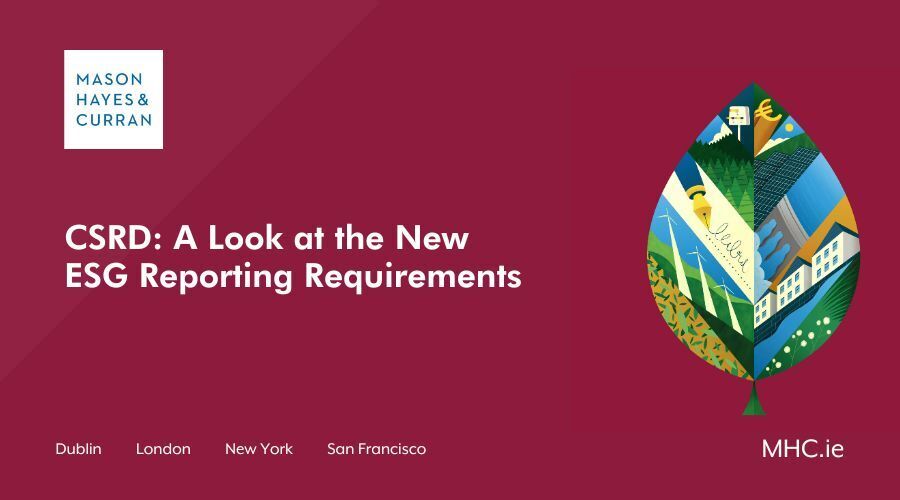CSRD: A Look at the New ESG Reporting Requirements

The Corporate Sustainability Reporting Directive is likely to come into force in Ireland by June 2024. The Directive aims to harmonise and improve the extent of ESG information available to stakeholders. It will impose mandatory sustainability reporting requirements on approximately 50,000 companies across the EU and beyond. Emer Shelly and Jay Sattin, Partners, explain who will be subject to the Directive and what they need to do to comply with it.
For most consumer product producers, sustainability is no longer a trend but a necessity and a key element of business strategy. Producers are increasingly finding innovative ways to reduce their environmental impact and demonstrate social responsibility, whilst still delivering high quality products.
However, as stakeholders become more vigilant against greenwashing, there is growing demand for accurate, reliable, transparent, and comparable sustainability information.
The EU has taken steps to address that demand across all business sectors by the adoption, earlier this year, of the Corporate Sustainability Reporting Directive (CSRD). The CSRD introduces a new harmonised sustainability reporting framework which will require approximately 50,000 organisations across the EU and beyond to make detailed disclosures on their impact and performance relating to a broad range of environmental, social and human rights and governance factors in accordance with a uniform set of reporting standards.
Scope of the CSRD
Reporting obligations under the CSRD will apply to the following categories of companies, with staggered reporting commencement dates for each category.
Category | Description | Commencement of CSRD obligations |
Large Public Interest Undertakings | EU listed undertakings meeting at least one of the following criteria: | 1 January 2024 (reporting in |
Large Undertakings | EU undertakings meeting at least two of the following criteria: | 1 January 2025 (reporting in |
Listed SMEs | All companies with securities listed on an EU-regulated market | 1 January 2026 (reporting in |
Non-EU undertakings | Third country undertakings generating an annual net turnover of | 1 January 2028 (reporting in |
Key points to note
- Reporting standards known as the European Sustainability Reporting Standards (ESRS) specify, in prescriptive detail, the information required to be reported in order to comply with the CSRD. The first set of 12 ESRS, which include topics such as resource use and circular economy, were adopted by the European Commission on 31 July 2023, with additional “sector specific” ESRS to follow in due course covering, for example, the textiles, accessories, footwear and jewellery sector and the food and beverages sector
- Whilst certain disclosure requirements set out in the ESRS are mandatory for all organisations within the scope of the CSRD, the extent of an organisation’s disclosure requirements on specific environment, social and governance issues will in large part depend on the outcome of its ‘double materiality assessment’. This means the organisation will need to consider the importance of various sustainability topics on its own performance (financial materiality) and on its external impact on the environment and people (impact materiality) and report on any topic that is material in either respect
- In-scope organisations may be required to obtain material sustainability information from its value chain (ie its direct and indirect business relationships upstream and/or downstream). This information may be difficult to obtain so there is currently a three year transitional period during which more limited reporting may apply in relation to an organisation’s value chain
- Sustainability information must be reported in a dedicated sustainability statement within the annual management report and digitally tagged to ensure it is machine readable and therefore more easily accessible
- The CSRD will introduce an independent assurance requirement to ensure the accuracy and reliability of sustainability information. Assurance will be carried out by statutory auditors or accredited national service providers
Preparation for the CSRD
Any consumer product producer within the scope of the CSRD needs to begin preparing as soon as possible for its reporting obligations by assessing its current data collection and reporting practices, identifying gaps, and developing a plan to satisfy its CSRD reporting requirements.
Impact on out of scope businesses
Smaller consumer product producers which are not within the scope of the CSRD will not be immune from its impact. The CSRD is likely to accelerate the growing trend whereby smaller businesses are finding themselves expected or inclined to carry out some level of sustainability reporting. For example, small consumer product providers who are within the value chain of large or listed upstream suppliers, or downstream wholesale/retail customers or those who are seeking investment or other third party finance will likely be required to provide comprehensive sustainability information to those value chain partners and investors/lenders. Voluntary sustainability reporting will also be driven by consumer product producers who are anxious to build a positive brand reputation with ‘conscious consumers’ who are increasingly concerned about environmental and social issues.
For more information and expert advice on the implementation of the CSRD’s reporting obligations, contact a member of our Corporate Governance team.
The content of this article is provided for information purposes only and does not constitute legal or other advice.
Share this:



